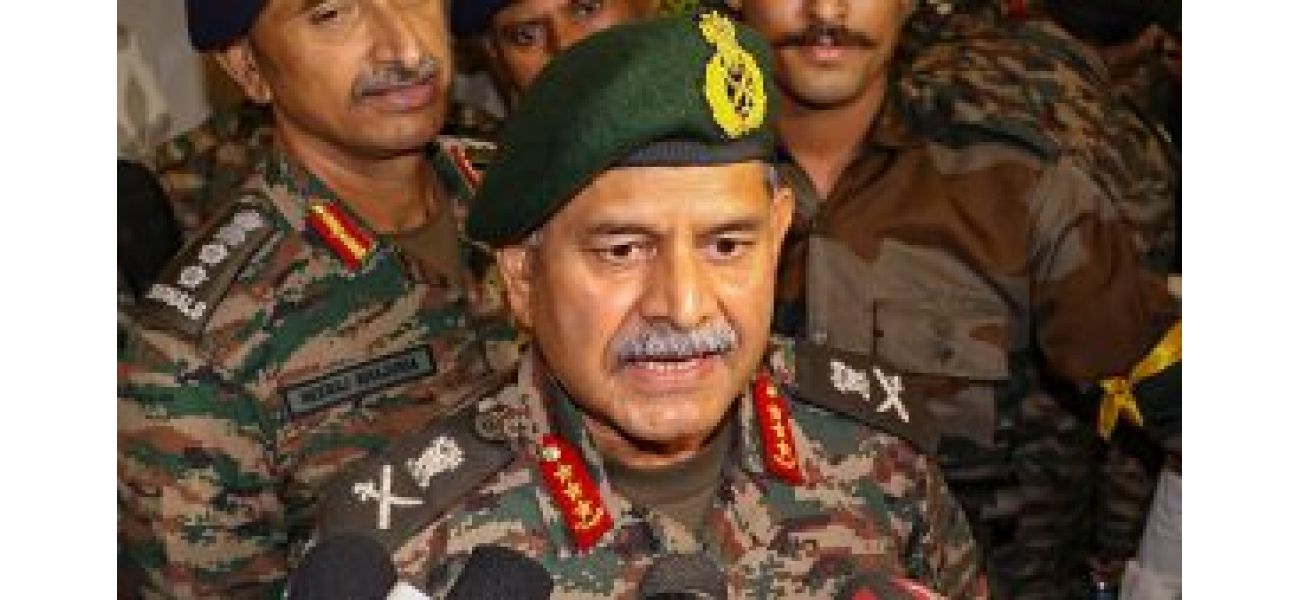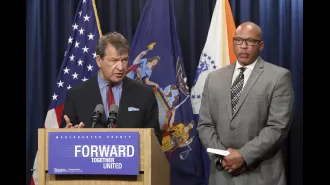Using persuasive language and powerful arguments to influence and motivate people in the military.
Leaders in powerful roles must speak carefully, as their words have great impact and can have serious consequences. This is particularly important for diplomats and military leaders.
October 8th 2025.

When you hold a high position, it's important to be careful with your words. Your words have a lot of weight and can have a huge impact on any situation. It's especially crucial for top diplomatic and military officials to choose their words wisely, as their statements are seen as official government positions by leaders from other countries, whether they are friends or foes.
During a recent visit to troops stationed in Rajasthan on 4 October, Indian Army Chief General Upendra Dwivedi issued a strong warning to Pakistan. He declared that India would no longer hold back if Pakistan continued to support terrorism. General Dwivedi stated, "India is fully prepared this time...We will take it a step further and Pakistan will have to think about whether it wants to remain on the world map."
Meanwhile, Air Chief Marshal AP Singh also made a statement about the recent airstrikes on Pakistan during Operation Sindoor. He confidently stated that at least a dozen Pakistani aircraft, including US-supplied F-16 jets, were destroyed or damaged. He dismissed Pakistani claims of Indian losses as mere "fanciful stories." Defense Minister Rajnath Singh also reinforced India's readiness to take strong action if national security is threatened. He specifically warned Pakistan against any misadventure in the Sir Creek sector, a disputed area between India and Pakistan. Singh made it clear that any provocation would be met with a decisive response that could change both "history and geography."
In response to these statements, Pakistan's Defense Minister Khawaja Asif called them "delusional, provocative, and jingoistic." He also issued his own threats, warning that India would face dire consequences if they continued to provoke Pakistan. Asif went on to say, "These statements from Indian political and military leadership are a desperate attempt to restore their tarnished reputation. After a decisive defeat, with a score of 0-6, if they try again, the outcome will be even worse." While Asif did not explain the "0-6" reference, it seems to be related to unverified Pakistani claims of shooting down six Indian fighter jets during Operation Sindoor. However, Pakistan has not provided any evidence to support these claims.
It's important to note that such aggressive rhetoric from top military officials can blur the lines between military professionalism and political positioning. It's inappropriate and dangerous for serving military leaders to make such aggressive public statements, as it can lead to further military escalation. Since the ceasefire between India and Pakistan was reached after four days of intense military confrontation, high-ranking Indian military officials have been making such public statements.
When General Dwivedi stated that "India is fully prepared this time," it also implies that the country was not prepared during the previous confrontation in May. This kind of heated exchange between the military and political leaders of both nations will only worsen the animosity between the two nuclear-armed neighbors. India and Pakistan's relationship has drastically deteriorated since the Pahalgam terror attack on 22 April, where 26 innocent tourists were killed by Pakistan-sponsored terrorists.
In response, India took several diplomatic actions, including suspending the Indus Waters Treaty, which had been in place for three wars. India has also made it clear that any future dialogue with Pakistan will focus solely on the return of Pakistan-occupied Kashmir to India. However, India has not been successful in convincing world leaders of Pakistan's role in the terror attacks.
Meanwhile, Pakistan has received billions of dollars in funds from the International Monetary Fund and has signed a military deal with Saudi Arabia, known as the Strategic Mutual Defense Agreement. This agreement ensures that Pakistan will have the backing of Saudi Arabia in the event of a war. Pakistan is also working on forming a military alliance with various Muslim nations, showing their focus on strengthening diplomatic relations and forming strategic military partnerships. India needs to focus on their foreign relations and building diplomatic friendships on a global level. Relations with the US have also soured, especially after Operation Sindoor, where India repeatedly refuted US President Donald Trump's claims of being a peacemaker and preventing a war between the two nations.
India and Pakistan have a long history of conflict, with three major wars and numerous skirmishes since their independence in 1947. Any further escalation in aggressive rhetoric, especially from top officials, risks destabilizing the fragile ceasefire and regional peace. This is something that neither country can afford at this point in time.
During a recent visit to troops stationed in Rajasthan on 4 October, Indian Army Chief General Upendra Dwivedi issued a strong warning to Pakistan. He declared that India would no longer hold back if Pakistan continued to support terrorism. General Dwivedi stated, "India is fully prepared this time...We will take it a step further and Pakistan will have to think about whether it wants to remain on the world map."
Meanwhile, Air Chief Marshal AP Singh also made a statement about the recent airstrikes on Pakistan during Operation Sindoor. He confidently stated that at least a dozen Pakistani aircraft, including US-supplied F-16 jets, were destroyed or damaged. He dismissed Pakistani claims of Indian losses as mere "fanciful stories." Defense Minister Rajnath Singh also reinforced India's readiness to take strong action if national security is threatened. He specifically warned Pakistan against any misadventure in the Sir Creek sector, a disputed area between India and Pakistan. Singh made it clear that any provocation would be met with a decisive response that could change both "history and geography."
In response to these statements, Pakistan's Defense Minister Khawaja Asif called them "delusional, provocative, and jingoistic." He also issued his own threats, warning that India would face dire consequences if they continued to provoke Pakistan. Asif went on to say, "These statements from Indian political and military leadership are a desperate attempt to restore their tarnished reputation. After a decisive defeat, with a score of 0-6, if they try again, the outcome will be even worse." While Asif did not explain the "0-6" reference, it seems to be related to unverified Pakistani claims of shooting down six Indian fighter jets during Operation Sindoor. However, Pakistan has not provided any evidence to support these claims.
It's important to note that such aggressive rhetoric from top military officials can blur the lines between military professionalism and political positioning. It's inappropriate and dangerous for serving military leaders to make such aggressive public statements, as it can lead to further military escalation. Since the ceasefire between India and Pakistan was reached after four days of intense military confrontation, high-ranking Indian military officials have been making such public statements.
When General Dwivedi stated that "India is fully prepared this time," it also implies that the country was not prepared during the previous confrontation in May. This kind of heated exchange between the military and political leaders of both nations will only worsen the animosity between the two nuclear-armed neighbors. India and Pakistan's relationship has drastically deteriorated since the Pahalgam terror attack on 22 April, where 26 innocent tourists were killed by Pakistan-sponsored terrorists.
In response, India took several diplomatic actions, including suspending the Indus Waters Treaty, which had been in place for three wars. India has also made it clear that any future dialogue with Pakistan will focus solely on the return of Pakistan-occupied Kashmir to India. However, India has not been successful in convincing world leaders of Pakistan's role in the terror attacks.
Meanwhile, Pakistan has received billions of dollars in funds from the International Monetary Fund and has signed a military deal with Saudi Arabia, known as the Strategic Mutual Defense Agreement. This agreement ensures that Pakistan will have the backing of Saudi Arabia in the event of a war. Pakistan is also working on forming a military alliance with various Muslim nations, showing their focus on strengthening diplomatic relations and forming strategic military partnerships. India needs to focus on their foreign relations and building diplomatic friendships on a global level. Relations with the US have also soured, especially after Operation Sindoor, where India repeatedly refuted US President Donald Trump's claims of being a peacemaker and preventing a war between the two nations.
India and Pakistan have a long history of conflict, with three major wars and numerous skirmishes since their independence in 1947. Any further escalation in aggressive rhetoric, especially from top officials, risks destabilizing the fragile ceasefire and regional peace. This is something that neither country can afford at this point in time.
[This article has been trending online recently and has been generated with AI. Your feed is customized.]
[Generative AI is experimental.]
0
0
Submit Comment





